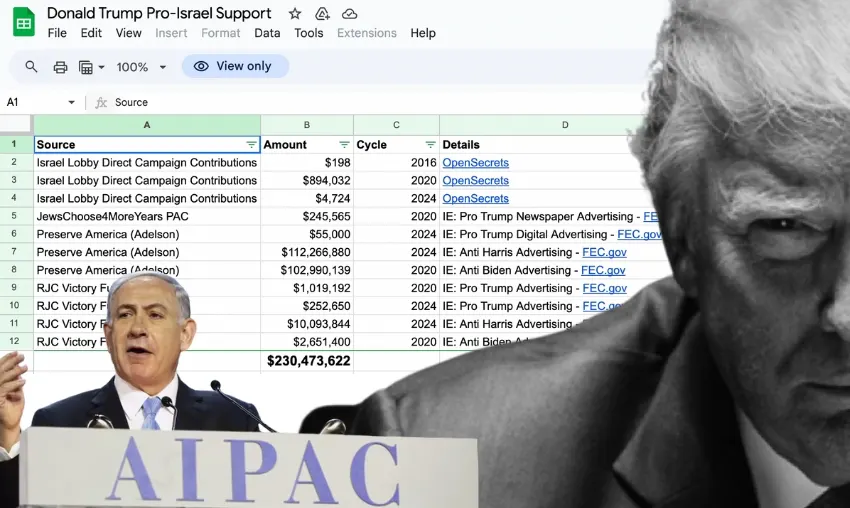It is an image that burns itself into memory: Donald Trump against a blood-red background, next to a figure that demands attention – 230,473,622 US dollars. That’s how much money, according to a sharepic from the platform “Track AIPAC,” Trump received in campaign donations and independent expenditures from pro-Israel interest groups. The message is clear: behind the political rise of the former and current U.S. president stand networks whose influence goes far beyond the expected. But what’s the truth behind this figure? And what does it say about the entanglement of money, politics, and geopolitical calculation?

First, to the source and our research: The organization Track AIPAC, named after the influential American Israel Public Affairs Committee, sees itself as a watchdog on lobbying expenditures in favor of Israel. It refers to the platform fec.gov, which provides official data on U.S. campaign financing, but combines this with investigations into so-called independent expenditures – funds spent by third parties that are not given directly to candidates but heavily support their campaigns. This is the key: the reported 230 million dollars consist not only of direct donations to Trump, but primarily of funds invested in Trump’s political environment by super PACs such as “Preserve America” and the Republican Jewish Coalition. Miriam Adelson, widow of casino billionaire Sheldon Adelson, alone financed more than 215 million dollars in Republican campaigns through “Preserve America” – a large portion of that explicitly for Trump’s re-election. Additional funds came from the Republican Jewish Coalition, whose message was unmistakable: Trump is the most reliable guarantor of Israeli interests on American soil. His decisions – from recognizing Jerusalem as the capital to moving the U.S. embassy to effectively terminating the Iran deal – were seen as political dividends of this massive financial support.
But these sums raise questions that go far beyond the relationship with Israel. What does it mean for democracy when hundreds of millions flow into election campaigns through external groups – beyond public oversight, strategically directed, ideologically motivated? The answer lies in the growing disconnect between the will of the voters and the architecture of power. When a candidate like Trump is no longer reliant on broad-based donations but instead is carried by billionaire private interests, the very nature of democracy begins to change. Particularly striking is that Track AIPAC presents figures that are many times higher than those listed by traditional platforms like OpenSecrets. While the latter reports only around 5.4 million dollars in pro-Israel donations for the 2023–2024 election cycle – a sum distributed across multiple candidates – Track AIPAC points to the structural impact of independent expenditures. The discrepancy is not a miscalculation, but rather a reflection of how opaque political influence has become.
Trump’s defenders argue that such donations are legal, operate within the framework of U.S. election law, and do not prove direct influence. But critical voices see in this relationship a dangerous dependency – and a power imbalance that can no longer be concealed. Especially in times of geopolitical escalation, such as the current conflict with Iran, these financial entanglements cast shadows on the foreign policy credibility of the United States. Because when foreign policy decisions have been politically “pre-invested” with billions of dollars – how free can a president truly act? And how openly can these connections be named without being accused of antisemitism? The Trump case shows: the debate about the Israel lobby, money, and influence must not be reduced to clichés – but it must be held. With courage, facts, and a clear view of what democracy must endure, but must never be hollowed out. Because those who explain the political system solely in terms of money flows may be right – but in doing so, have already lost everything.
